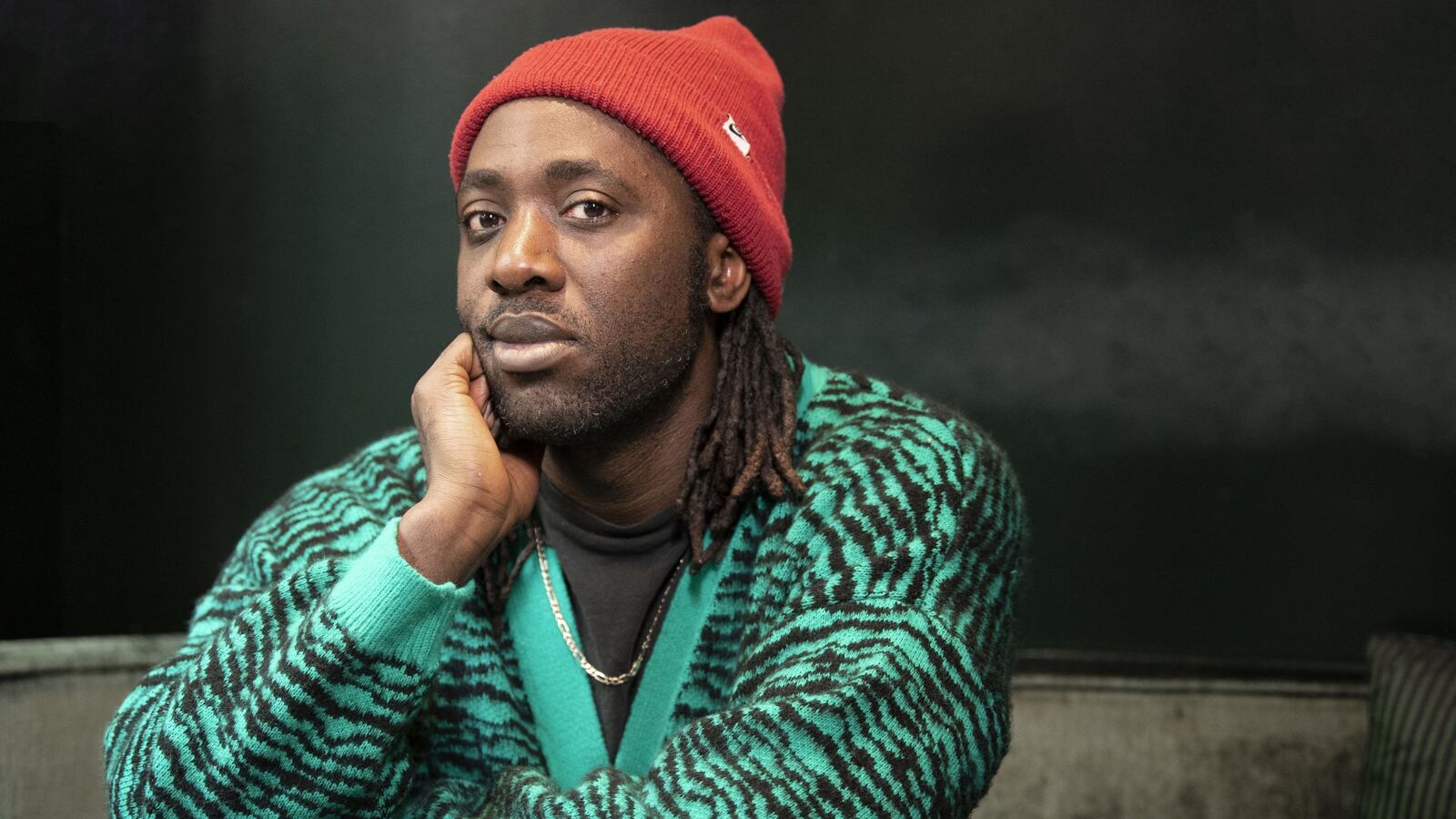Bloc Party are back with their first new album in six years, and it has nothing to do with the “indie sleaze” revival.
Sure, the hipster culture of the mid-to-late aughts—during which bands like Bloc Party, Girl Talk, and Franz Ferdinand saturated every millennial adolescent’s iPod—is allegedly making a comeback and driving the “vibe shift.” But Alpha Games, which arrived on Friday, is not cheap nostalgia bait. Bloc Party’s all grown up here, with the veteran indie rockers’ new, reinvigorated lineup tearing through social turmoil as they attempt to find their footing in 2022.
That newfound vigor, appropriately enough, has its roots in the Silent Alarm anniversary shows the band played in 2018 and 2019. Enlivened by performing their epochal 2005 debut album in full, they were “in a really good place as a band” and by the end of the tour, had sketched out about 30 ideas for new songs, frontman Kele Okereke recently told The Daily Beast. But when the pandemic hit, they were left “sitting in our hands.”
“My fear was that knowing how my mind operates, kind of sitting with the music for a year… I just want to start changing everything, because it wouldn’t feel representative of where I was in that moment,” Okereke says. “I had to really protect myself against that instinct, because we were all so happy with how things were feeling at the end of 2019. In my mind, it was paramount that we captured the energy we had then, and not tweak things too much so that it started to look different.”
Part of that is wanting to honor the new and different perspectives within Bloc Party itself—Alpha Games marks the first album Okereke and fellow founding member Russell Lissack made with new bassist Justin Harris and drummer Louise Bartle, who first joined them on tour a few years back. Asked if he’s still in touch with original Bloc Party drummer Matt Tong, who left the band after the release of Four in 2013, or bassist Gordon Moakes, who followed suit two years later, Okereke is decidedly pragmatic.
“No. I mean, I’m kind of, ‘Once a door’s closed, it’s closed,’ for me,” he says. “I think I reached out to Matt a while ago when he got married, but I’m of the mindset that although there is no bad blood on my part, I don’t really want either of them in my life right now. That might change, but that might not. Having been doing this now for almost 20 years, I understand that with this pace of living that you have as a professional musician, you’re constantly traveling, touring, whatnot. People can come into your life and they can go, and I don’t get sad about it. I’m always thankful for the lessons that I’ve been taught after relationships have ended, because there’s no point if you’re not going to reflect on what’s just happened.”

Bloc Party
Wunmi OnibudoIt’s a fitting segue into the new album, which is all about dissecting tense relationships within a sonically furious framework. After Bloc Party’s fifth album, 2016’s Hymns, which failed to win over fans with its meditative and spiritual themes, Alpha Games hits like a punch to the face. From frenetic opening track “Day Drinker,” there’s a palpable air of discomfort that carries through the rest of the album’s tales of rivalry, manipulation, and anger.
“To me it does feel like quite a dark record, a quite ugly record in places. Not so much musically, but just in terms of what’s happening, in terms of the characters and the vignettes and the stories. It all seems like everyone’s fucking everyone over,” Okereke says.
“And to be honest, that was one of the hardest things about having to take a break. In 2020 when the pandemic happened, although we weren’t recording the songs, I was still thinking about them. They were still inhabiting me, and I was still kind of in that space, and it was quite a dark space, I have to say,” he continues. “So I was just so thankful when we actually recorded the album, and it was just down, and it could leave me, and I didn’t have to think about this stuff because I think it made me colder in some ways, making this record.”
Okereke oozes bitterness and bile on much of the album; he can be taunting and jeering, like on the venomous punk cut “Callum Is a Snake,” where he washes his hands of someone by hissing with blatant resentment, “You’re a snide little fuck.”
“I think saying those things out loud… they’re not just words. You kind of have to go there,” Okereke says. “I guess everyone’s process is different, but for me, I kind of had to go there and put myself in those situations and think about how I would react. ‘Callum Is a Snake’ is one of the ones that everyone knows—everyone has someone like that in their life that they have around, but they don’t really want to have around anymore. It was fun to kind of put someone on blast in that way. Callum’s not the real name, by the way.”
Similarly wicked is “Rough Justice,” which is not a Rolling Stones cover but instead a character study about “wealthy socialites with a sinister side,” as Okereke puts it. “I’ve just always found that idea of crime hiding beneath the surface quite a sexy idea,” he says, citing Bret Easton Ellis’ satirical thriller Glamorama as inspiration. It’s nearly impossible, however, not to draw parallels between these songs about social hierarchies and manipulative power figures, and the fucked-up state of global politics, which Okereke admits has left him more disillusioned than ever.
“I don’t know if it’s about being older, like turning 40, but I do feel a lot more cynical about people, about humanity,” he says. “I think we’ve had some really miserable years in the world, we’ve had some pretty awful things happening in rapid succession, and I’m not so confident about where we’re going as a human race. Look at what’s happening now with Russia and Ukraine. One man’s pride and ego is creating so much chaos and destruction and hurt for so many other people.”
It’s not a groundbreaking stance for a historically liberal musician like himself, but it’s a stance nonetheless, which is more than he can say for some of his peers in the industry who have made him question the perceived responsibility of being an artist and a public figure.
“I guess there are two sorts of artists right now. There are people that need a distraction from what’s happening right now in the world, and I get that on some level. I get that, that people don’t want to be reminded about the gruesome things that are happening,” he says. “But there are also artists that feel that now it’s time more than ever to be commenting on what’s happening, because it is so frightening. And I know as artists, we do have a voice and a platform, and an opportunity to turn our anxiety into art that helps people. I mean, I don’t know, I think that’s always how I’ve looked at it, at the duty that you have as a musician, as an artist, as a singer, as a songwriter, is that you kind of have to talk about the world that you see around you. Or else what’s the point?”
For all its bitter, serrated energy and tales of toxicity, Alpha Games still manages to find fleeting pockets of tenderness. “Of Things Yet to Come” is a lush, yearning heartbreaker, while standout track “If We Get Caught,” a gauzy, earnest ode to ride-or-die love, immediately became a fan-favorite upon its early release last month. Even album closer “The Peace Offering” begins as a mellow-sounding resignation of sorts, with spoken-word verses about giving up grudges and casting malice aside. It’s not long, though, before the track erupts into angry noise as Okereke repeatedly warms, “next time, do the right thing,” ending the album on a chilling and chaotic note.
“It just feels like this very cold kind of sublimation of... This anger that you’ve heard throughout the album has now been replaced by something a bit more painful, which is just cold indifference,” Okereke says. “Looking at someone that you used to be close to, and now they’re nothing. Now there’s not even the fire of anger, it’s just a cold indifference. I think that’s one of the Bloc Party songs I’m most proud of.”

If that’s true, then it’s a testament to Okereke’s belief that the band’s best years may still be in front of them—which should be music to the ears of fans who had cast Bloc Party aside after they failed to sustain the momentum of their early ’00s albums Silent Alarm, A Weekend in the City, and Intimate. The biggest takeaway from Alpha Games is perhaps that Bloc Party, who are now coming up on 20 years as a band, still has the capacity to shock and excite.
“I always hear things in records after they’ve been done that I would’ve liked to have done differently,” Okereke says. “But I think that’s part of the process, and I think that’s why I’ve been so prolific, I guess, in the time that I’ve had is that me wanting to escape what I’ve done is part of the motivation to start something new. It always has been.”


